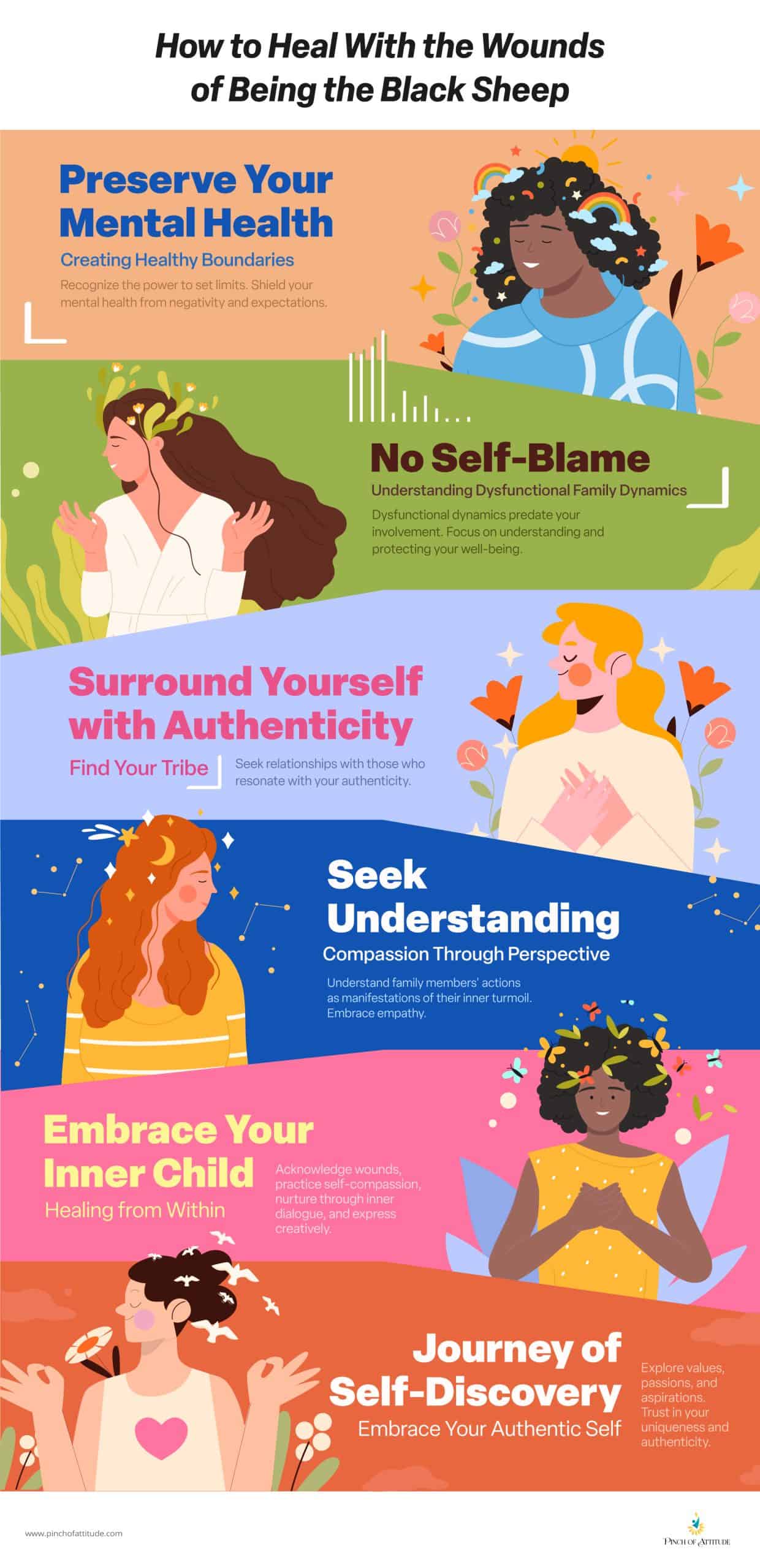We live in a world that often seeks conformity. But in that same world exists a unique breed of individuals: the black sheep of the family.
I, too, know what it means to wear that label. Did I hate it? Not really, in fact, I learned to love it.
Growing up, my mother’s unrealistic expectations and rigid beliefs constantly set us on opposing paths. She believed beauty was destiny, and if you weren’t born with it, you were bound to fail.
In her eyes, I was the rebellious explorer, a deviation from her ideal.
But today, I stand before you, thankful for being the family’s black sheep. If you’d like to learn how I changed my mindset, let me share with you my story.
- Being the Black Sheep stems from intricate family dynamics; understanding these can guide your self-identity journey.
- Embracing the role of the Black Sheep isn’t about seeking external validation, but about staying true to yourself.
- It’s very important that you recognize and nurture your inner child’s wounds for you to heal properly. You can start by engaging in self-reflection and surround yourself with trusted people.
Table of Contents
What Is the Black Sheep of the Family?

The black sheep of the family within a family context is a member who stands out, often in a way that doesn’t conform to the rest of the family members’ expectations or values. They are seen as different, maybe rebellious, and might not fit the mold that their parents or siblings have set.
I was the black sheep of the family and being the black sheep of the family means straying from the established path, sometimes for the better and sometimes due to circumstances beyond one’s control. It’s about being unique and authentic in a family that might not always understand or appreciate those qualities.
Suspecting you’re the black sheep of your family? If you’ve ever felt like the lone wolf, like you don’t belong, if you’ve questioned the values and expectations imposed upon you, then you may indeed relate to the concept of the black sheep.
But there must be underlying factors that made you that way, right?
6 Types of Family Dynamics Where Black Sheep Is Created
The black sheep of a family often comes from complex and unaccepting family dynamics that can be challenging to navigate.
Here are six instances where one family member ends up being treated like black sheep:
- When you’re the child who has the least in common with family members: Having differences in interests, values, or personality traits can make you feel like the odd one out. This inability to relate to your family’s common ground can lead to a sense of isolation.
- If you show that you can do better than your parents: When the black sheep becomes successful, it demonstrates ambition beyond your parents’ accomplishments can trigger jealousy or insecurity. This may result in you being labeled as the family’s black sheep for deviating from the expected path.
- If you feel lost and can’t express your feelings to your parents: Difficulty in effectively communicating your emotions can create misunderstandings and a sense of alienation within the family. The inability to connect on an emotional level can contribute to you being the family’s outcast.
- Sibling rivalry: Sibling competition and rivalry can cast one as the black sheep, particularly if their unique qualities challenge the established family dynamics. Standing out can lead to resentment or exclusion.
- When one or both of your parents are not happy with themselves: Parental dissatisfaction can project onto their children, making one person in the family a receptacle for unresolved issues. This can lead to feelings of inadequacy and being singled out.
- Childhood Emotional Neglect (CEN): Growing up in an emotionally neglectful environment, where feelings and emotional needs are ignored or invalidated, can result in feeling disconnected from your family. As a coping mechanism, you may have adopted the black sheep role as a way to survive.
Signs That You Were Chosen to Play the Role of the Black Sheep in the Family
As someone who has embraced the role of being the black sheep of the family, I often pondered, “Why am I the black sheep of the family?” It’s a question that lingered in my mind, leading me to reflect on the unique position I found myself in.
It’s a question that may have lingered in your mind, and you’re not alone in your curiosity. I walked (and continue to walk) this path, so I understand the contemplation that comes with it.
Below are signs you are the black sheep of your family and hopefully it will shed light on why you might have been selected to play this distinctive role:
- Differing values: When you are the black sheep of the family, your values and beliefs differ greatly from the rest. As such, your family might feel a sense of disconnect and hold you responsible for it.
- Independent spirit: The family black sheep is often the one who displays a strong sense of independence and resistance to conforming to familial expectations.
- Unconventional interests: Many black sheep have hobbies and interests that deviate from the family norm, setting them apart.
- Ambitious aspirations: You harbor ambitious dreams that challenge the status quo, which might be unsettling to your family. This unwavering pursuit of unconventional goals can create a sense of discomfort within the familiar family landscape.
- Emotional sensitivity: You’re more emotionally attuned and sensitive than other family members. In turn, your family treats you differently and you can’t relate to their emotional detachment.
- Conflict magnet: Your readiness to voice dissenting opinions frequently entangles you in family disputes. Your inclination to challenge the status quo can become a recurring source of tension.
- Different life choices: Your career paths and relationships sharply diverge from family expectations, creating friction. Your pursuit of a unique life journey challenges conventional norms and fosters disagreement.
- Natural rebel: From a young age, you harbored an innate rebellious streak, resisting authority and parental control. Your independent spirit clashed with their expectations, solidifying your role as the family’s black sheep.
- Emotional expression: Within the family, you’ve faced challenges in expressing your feelings and emotions. This struggle has created a perception of distance or being hard to understand, reinforcing your black sheep status.
- Scapegoat label: Family members may have projected their own shortcomings onto you and treat you like the scapegoat for familial issues and frustrations.
How Can You Make It Easier to Be the Black Sheep?
Drawing from my own experiences, there were times when I felt the need to distance myself from the family dynamics that didn’t resonate with my authentic self. It was during these moments when the black sheep walks away to find solace and understanding beyond the confines of the immediate family.
Yet, through the years, I’ve discovered ways to embrace and thrive in this unique role.
I realized that embracing the black sheep role wasn’t about seeking approval. It was about being true to myself.
I would recommend below ideas to make your life easier to manage as the black sheep of the family:
Surround Yourself With Supporting Family Members and Friends
Much like you, I also had narcissistic family members whose attitudes and actions often felt harsh and unrelenting.
These experiences led me to seek solace and understanding beyond the confines of my immediate family.
I found refuge in the company of friends who cherished my authenticity and encouraged me to stay true to my values and aspirations.
Their unwavering support provided a safe haven where I could be myself without judgment or criticism.

Speak Up and Don’t Be Afraid Doing It
I reached a point in my life where I realized that certain family members held unfavorable opinions of me regardless of my actions.
It became clear that trying to conform or seeking their approval was an uphill battle with no guarantee of success.
In such circumstances, choosing to be yourself, unapologetically, is liberating.
It’s an affirmation of your authenticity, and a refusal to let the judgments of others define you and a declaration that you won’t be constrained by their expectations or their animosity.
By boldly being yourself, you not only stay true to your values and aspirations but also inspire others to do the same.

Always Take Time to Reflect and Do Your Best to Not Let Words Hurt You

People who are unhappy with themselves often project their insecurities onto others. And as the family’s black sheep, this includes negative judgments and hurtful words they may direct at you.
In my own journey, I’ve found solace in recognizing that these hurtful words are often more reflective of the speaker’s inner turmoil than a true reflection of my worth.
It can be challenging not to take these words personally, but remind yourself that you are not defined by the judgments of others.
Instead of internalizing their negativity, try to empathize with their struggles. Feel compassion for them and understand that their words stem from their own emotional pain.
This shift in perspective can help you maintain your inner peace and emotional well-being, allowing you to rise above the hurtful comments.

Stay True to Yourself, Nothing Beats Authenticity
As I got older, I’ve come to appreciate the immense power of staying true to oneself.
Being the black sheep of the family provided me with a unique perspective and an opportunity for profound growth.
The power of being the black sheep in your family lies in the ability to embrace authenticity and challenge the status quo.
Like you, I’ve encountered countless individuals who, consciously or unconsciously, mold themselves to fit into societal molds or meet expectations.
It’s an all too common phenomenon. The desire to blend in, to avoid standing out too conspicuously.
I’ve observed that a significant percentage of people often compromise their true selves in the pursuit of acceptance or belonging.
They wear masks, hide their unique qualities, or suppress their genuine passions, all in the name of conformity.
This is why life coaches or confidence coaches exist.
They play a crucial role in helping individuals rediscover their true essence and summon the courage to be unapologetically themselves.

How to Heal Your Wounds of Being a Black Sheep?
As someone who has journeyed through the complexities of being the black sheep of the family, I know that this role can leave its mark.
It’s a path that often requires inner strength, resilience, and a willingness to confront the emotional wounds that may have accumulated over time.
The journey of healing begins with recognizing the need to care for yourself and address these wounds.
Here’s what I did (and am continuously doing) to heal the scars and emerge from this experience not as a victim but as a stronger, more self-aware individual:

Preserve Your Mental Health by Creating Healthy Boundaries
Establishing healthy boundaries is important to maintaining your emotional well-being.
As the black sheep in your family, was there also a time in your life when a family reunion became overwhelming, with relentless comments and judgments?
Are you not comfortable being around your family? Were there instances when your family spoke badly about you behind your back?
I remember one such occasion when my mother’s unrealistic expectations collided with my desire for authenticity.
In those moments, it’s crucial to recognize that you have the power to set limits on what you’re willing to tolerate.
You, too, can establish clear boundaries that shield your mental health from the negativity and expectations that may surround you.
Remember, setting and maintaining boundaries is a form of self-care and self-preservation.
It empowers you to protect your mental health and emotional well-being while fostering healthier family interactions.
Whatever You Do, Do Not Blame Yourself for Your Dysfunctional Family
I understand the weight that can come from feeling responsible for a dysfunctional family dynamic.
In my own journey, there was a time when I constantly questioned if I was somehow to blame for the discord within my family.
I’d replay past arguments and conflicts in my mind, wondering if there was something I could have done differently to prevent them.
But you and I both know that this self-blame is a heavy burden to carry.
Dysfunctional dynamics often have deep-rooted causes that predate your involvement. You didn’t create these issues, nor can you single-handedly fix them.
Instead, I’ve learned that it is more productive to focus on understanding and accepting the family dynamic as it is, while also taking steps to protect your own well-being.
Surround Yourself With People Who Are as Authentic as You
In my own journey, I realized that spending time with individuals who understood and celebrated my authenticity was essential for my well-being.
I remember meeting a close friend who, like me, had a unique perspective on life and didn’t conform to societal expectations.
Our friendship was a breath of fresh air, a place where I didn’t have to explain or defend my choices. We were both free to be ourselves, unapologetically.
I encourage you to seek out and nurture relationships with those who resonate with your authenticity.
By observing these qualities in others, you can identify those who are more likely to provide the understanding and support you need as you navigate your role in the family.
Try to See Your Family’s Perspective, Understanding Breeds Compassion
There was a time when anger and resentment consumed me, particularly towards my mother for the abuse I endured.
I vividly remember the moments when I harbored thoughts of ill-will towards her, wishing for bad things to happen in return.
But as I matured and gained more life experience, I began to look at my mother’s life from a different angle.
I went on a journey of reflection, trying to understand why she had become the person she was. It wasn’t an easy process, and it took time to peel back the layers of my own hurt and anger.
I slowly came to realize that my mother’s actions, driven by greed and jealousy, were rooted in her own unhappiness and disappointment with the way her life had unfolded.
I saw her struggles and the weight of her unmet needs.
In that shift of perspective, I no longer felt anger. Instead, a deep sense of sadness washed over me.
I started to understand that people’s actions are often a manifestation of their own inner turmoil and pain.
It was a turning point in my journey, leading me down a path of compassion and empathy for my family members.
Understanding their perspective, even if it doesn’t excuse their actions, can be a transformative step in your healing journey.
Embrace Your Wounded Inner Child, She Needs You Always
I can recall moments when I felt like that lost and alone little girl, carrying the heavy burden of hurtful words and the weight of unrealistic expectations.
There were times when I was told that I was ugly and stupid and that I wouldn’t amount to anything.
Those words etched themselves deeply into my consciousness, shaping my self-perception and influencing the way I navigated relationships and life.
Our inner child, as I’ve come to understand, bears the deepest scars from our formative years. It’s the part of us that experienced the pain, rejection, and trauma during our childhood.
To heal and grow, I learned that we must learn to listen to and nurture that wounded inner child.
Through the guidance of therapy, profound self-reflection, and a newfound sense of self-compassion, here’s how you can start your healing journey, too:
- Self-reflection and acknowledgment: Begin by acknowledging the wounds and emotions of your inner child. Reflect on past experiences that have left a lasting impact. And understand that these feelings are valid and deserve recognition.
- Self-compassion: Treat your inner child with the same compassion and kindness that you would offer to a child in distress. Reassure yourself that it is okay to feel vulnerable and that you deserve love and care.
- Inner dialogue: Develop a nurturing inner dialogue. When you encounter moments of self-doubt or self-criticism, respond as you would to a young child in need of encouragement. Offer words of love, support, and validation.
- Creative expression: Explore creative outlets such as art, journaling, or writing letters to your inner child. These activities can help you connect with and express the emotions and experiences that your inner child carries.
Take This Opportunity to Focus On Your Self-Discovery and Soul Search
Being the family’s black sheep provided me with a unique perspective and an opportunity for profound growth.
Do you recall moments when the weight of your family dynamics pushed you to seek answers within? I certainly do.
These moments of questioning led me on a path of self-discovery and introspection, as I sought to understand who I truly was beyond the family dynamics.
I used it as an opportunity to explore my values, passions, and aspirations, free from the constraints of others’ expectations.
I dove deep into my interests, engaged in activities that resonate with my soul, and allowed myself to evolve into the authentic and empowered individual I know I am.
As you discover more about yourself, embrace your authentic self unapologetically. Let go of the need to conform to others’ expectations, and trust in your own uniqueness. Your authenticity is your greatest strength.
Related Posts:
- Signs You Are the Black Sheep of Your Family: How I Remain Authentic and Adore My Unique Traits
- I Was the Black Sheep of the Family and How I Got Out and Win!
- Why Am I the Black Sheep of the Family? And Why I Don’t Allow It to Define Me
- The Power of Being the Black Sheep in Your Family: Why Standing Out Is My Greatest Asset
- I’m The Black Sheep In My Family and Why I’m Loving It!
Frequently Asked Questions
What exactly does being the “black sheep” of the family mean?
Being the “black sheep” means you stand out from your family due to differences in values, interests, or behaviors that don’t align with the family’s expectations or norms.
Are there specific reasons someone becomes the black sheep?
Yes, reasons can include having starkly different interests, achieving more than parents, being unable to express emotions, or being a result of parental dissatisfaction and Childhood Emotional Neglect (CEN).
How can you cope with the challenges of being the family’s black sheep?
You can surround yourself with supportive friends, speak up without fear, reflect on negative words without internalizing them, and always prioritize staying true to your authentic self.
What steps can you take to set healthy boundaries with your family?
You can start by beginning to identify specific behaviors or comments that trigger discomfort. Communicate these boundaries openly and assertively with your family, and establish consequences for when they’re violated.
How can you shift your perspective away from blaming yourself for your family’s dysfunction?
Practice self-compassion, treat yourself kindly, and understand you’re not responsible for deep-rooted family issues. Seeking external perspectives from trusted friends or therapists is also a great start.




